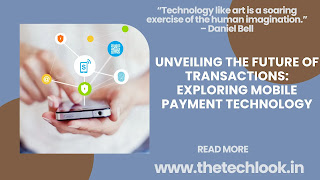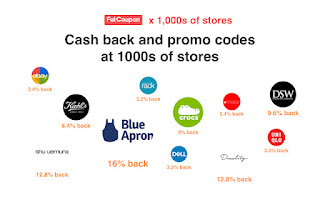Unveiling the Future of Transactions: Exploring Mobile Payment Technology
 |
| Unveiling the Future of Transactions |
Introduction
In today's fast-paced world, technological advancements have redefined the way we interact, work, and even conduct financial transactions. Among these transformative innovations, mobile payment technology stands out as a game-changer. As smartphones become an integral part of our lives, they are also becoming powerful tools for secure and convenient transactions. In this article, we delve into the world of mobile payment technology, exploring its significance, benefits, challenges, and its role in shaping the future of commerce.
The Rise of Mobile Payments: Redefining Transactions
Mobile payment technology refers to the use of smartphones or other mobile devices to make payments for goods and services. This technology leverages digital wallets, apps, and secure authentication methods to facilitate seamless transactions, reducing the reliance on physical currency or cards. With the widespread adoption of smartphones and the growing preference for contactless transactions, mobile payments have emerged as a transformative force in the world of finance.
 |
| FAT COUPON |
Key Components of Mobile Payment Technology
Mobile Wallets: Mobile wallets are digital applications that store payment information securely. They can house credit and debit card details, loyalty cards, and even cryptocurrency holdings. Apple Pay, Google Pay, Samsung Pay, and other similar platforms enable users to make payments by simply tapping their devices.
Near Field Communication (NFC): NFC technology allows devices to communicate wirelessly when they are near. This technology forms the foundation of contactless payments, enabling users to make transactions by tapping their smartphones on compatible payment terminals.
Biometric Authentication: Many mobile payment platforms incorporate biometric authentication methods such as fingerprint scanning, facial recognition, and even iris scanning. These measures enhance security by ensuring that only authorized users can access and initiate payments.
QR Code Payments: QR code-based payments are widely used in emerging markets. Users scan QR codes displayed by merchants to initiate transactions directly from their mobile wallets.
Peer-to-Peer (P2P) Payments: P2P payment apps allow users to send and receive money directly from their mobile devices. These apps have transformed how individuals split bills, repay debts, and even contribute to group expenses.
.jpg) |
| TOP COUPON CODES |
Benefits of Mobile Payment Technology
Convenience: Mobile payments eliminate the need to carry physical wallets or cards. Transactions can be initiated with a simple tap or scan, streamlining the checkout process.
Speed and Efficiency: Mobile payments are significantly faster than traditional payment methods. With NFC technology, transactions can be completed in a matter of seconds.
Security: Biometric authentication and encryption protocols enhance security, reducing the risk of fraud and unauthorized access to payment information.
Accessibility: Mobile payment technology has the potential to provide financial services to unbanked and underbanked populations, giving them access to digital transactions and online commerce.
Loyalty Programs and Rewards: Many mobile payment platforms integrate loyalty programs and rewards directly into the payment process, offering users incentives for using the technology.
Challenges and Considerations
Security Concerns: While mobile payment technology enhances security in many ways, it also introduces new cybersecurity challenges. Malware, phishing attacks, and data breaches can compromise user information.
Interoperability: The multitude of mobile payment platforms and methods can lead to interoperability challenges, where different systems struggle to communicate with one another.
Infrastructure: Not all merchants and businesses have the necessary infrastructure to accept mobile payments. Ensuring widespread acceptance requires investment in compatible terminals.
User Adoption: Some users may be hesitant to adopt mobile payment technology due to concerns about privacy, security, or simply a lack of familiarity with the technology.
 |
| Erste-Hilfe-Kurs Online inkl. Teilnahme-Bescheinigung |
The Future of Mobile Payment Technology
Contactless Becomes the Norm: As the world moves toward contactless transactions, mobile payments are poised to become the primary mode of payment for consumers globally.
Integration of Cryptocurrencies: With the growing popularity of cryptocurrencies, mobile payment platforms may integrate digital currencies, allowing users to make payments and store assets in one app.
Augmented Reality Payments: Augmented reality (AR) technology could enable users to make payments simply by scanning objects or images with their smartphones.
IoT and Seamless Transactions: The Internet of Things (IoT) could enable everyday objects to initiate transactions autonomously, creating a world of seamless payments.
Conclusion
Mobile payment technology has redefined the way we conduct transactions, offering unprecedented convenience, security, and efficiency. As this technology continues to evolve, it will play an increasingly pivotal role in shaping the future of commerce. From contactless payments and biometric authentication to integration with emerging technologies like AR and IoT, mobile payments are at the forefront of digital transformation, paving the way for a world where transactions are simpler, safer, and more connected than ever before.
ARTICLE RELATED TO:
future of technology, technology, What is blockchain technology, unveiling the $3.1 million secret - conquering big deals, future technology, best future technology, Future Technology 2050, Internet of Things, most impressive medical technology of all time, blockchain technology, unlocking the future, real estate technology, mobile payments, future of prop-tech, the executive founder of Singularity University, abundance the future is better than you think
FAQ
What is the future of mobile payments?
Mobile payment apps and other forms of digital payments (Bitcoin, peer-to-peer transactions) are reducing the need for physical cards. Future mobile payment processors will be able to handle a variety of payment options, including cash, traditional cards, and mobile wallets.
What is the global mobile payment transaction value?
According to Statista, global mobile payment transaction value is projected to exceed $4.7 trillion by 2023, highlighting the enormous potential of this industry. However, to take advantage of this growth, businesses need to quickly adapt to the dynamic marketplace and offer tailored solutions that meet the specific needs of their customers.
Why are mobile payments better than traditional payment methods?
Mobile payments provide a high level of convenience for consumers, allowing them to make purchases quickly and easily using their mobile devices. They also provide better security. Mobile payments are often more secure than traditional payment methods. Mobile payments can be more cost-effective for merchants than traditional payment methods.











.jpg)






